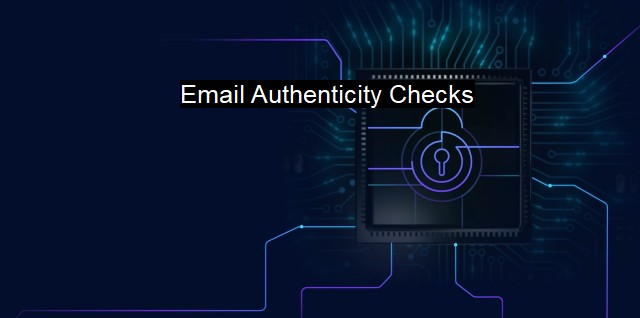What are Email Authenticity Checks?
Importance of Email Authentication Checks in Cybersecurity & Antivirus Protection: Digital Signatures, Verification, & Prevention of Spear Phishing and Email Spoofing
Email Authenticity Checks are methodologies to help ensure that an email sender is, indeed, who they claim to be – an integral part of cybersecurity and anti-virus practices. With increased usage of emails for personal and professional communication, it is paramount to affirm the genuineness of every communication to prevent email fraud and related cyber threats. Email authenticity checks play a substantial role in this process by authenticating the sender's identity.At its most essential level, an email authenticity check is a measure of cybersecurity designed to minimize spam emails, prevent phishing, and guard against various threats like malware installation. In a broader context, it is also seen as a method to retain trust in email communications and ensure only qualified messages make it to the recipient's inbox.
One of the commonly used methods for email authenticity checks is the SPF, DKIM, and DMARC trio. SPF (Sender Policy Framework) helps validate that an email originates from a server authenticated by the domain's administrators. It checks the sender's IP against a list of IPs permitted to send emails from that domain. SPF thereby prevents spammers from sending emails on behalf of spoofs or fake email addresses from a domain.
DKIM (DomainKeys Identified Mail) adds a digital signature to the headers of an email. This signature remains unchanged, even during forwarding, and thus can be used to check the authenticity of the sender and whether the message's content has been tampered with. Even if the sender's name is spoofed, the receiver server will utilize the signature to establish the email's originality.
DMARC (Domain-based Message Authentication Reporting and Conformance) combines SPF and DKIM, allowing the domain owner to define an email authentication policy. This policy specifies how the email(receiver) server should treat an email that fails SPF or DKIM checks. Also, the domain owner can request reports detailing how many emails are passing and failing these checks. Through DMARC, the domain owners have more control over who can send emails on their behalf, thereby enhancing their cybersecurity status.
Another factor to consider is the mismatch between the display name and the email address. Many phishing scams use this tactic, making the display name appear as a familiar institution or person to trick the user while the actual email address is different. Checking for such discrepancies is likewise part of an email authenticity check.
Email authenticity checks also examine the email's content, i.e., hyperlinks and attachments. These areas are common avenues for virus and malware installations. It's advised to hover over a hyperlink before clicking on it to see the actual site it points to, and avoid downloading attachments from unknown senders, a notable stipulation of any antivirus protocol.
Email authenticity checks are a need of the hour, considering the surge in phishing and spamming outcry. While user mindfulness is a crucial factor in dealing with email scams, robust defenses on a software front like SPF, DKIM, and DMARC protocols can significantly aid in securing email communications. Email authenticity can guard individuals and firms alike against potential threats that might lead to data breaches, financial losses, and damage to reputation, proving therefore to be a significant faction in cybersecurity and antivirus territories.

Email Authenticity Checks FAQs
What is an email authenticity check?
An email authenticity check is a security measure that verifies the sender's identity and ensures that the email has not been tampered with or forged. It helps protect against phishing, spoofing, and other cyber attacks.How does an email authenticity check work?
An email authenticity check uses various methods to evaluate the authenticity of an email. This includes checking the sender's domain name, verifying the email's message integrity, and analyzing the email header to ensure it meets specific standards.Why is email authenticity important?
Email authenticity is essential for protecting against cyber attacks and preventing online fraud. It helps establish trust between the sender and recipient and ensures that emails are not illegitimate or malicious.What are some tools for email authenticity checks?
There are several tools available for performing email authenticity checks, including SPF (Sender Policy Framework), DKIM (DomainKeys Identified Mail), and DMARC (Domain-based Message Authentication, Reporting, and Conformance). These tools help prevent email spoofing and ensure that emails are genuine and trustworthy.| | A | | | B | | | C | | | D | | | E | | | F | | | G | | | H | | | I | | | J | | | K | | | L | | | M | |
| | N | | | O | | | P | | | Q | | | R | | | S | | | T | | | U | | | V | | | W | | | X | | | Y | | | Z | |
| | 1 | | | 2 | | | 3 | | | 4 | | | 7 | | | 8 | | |||||||